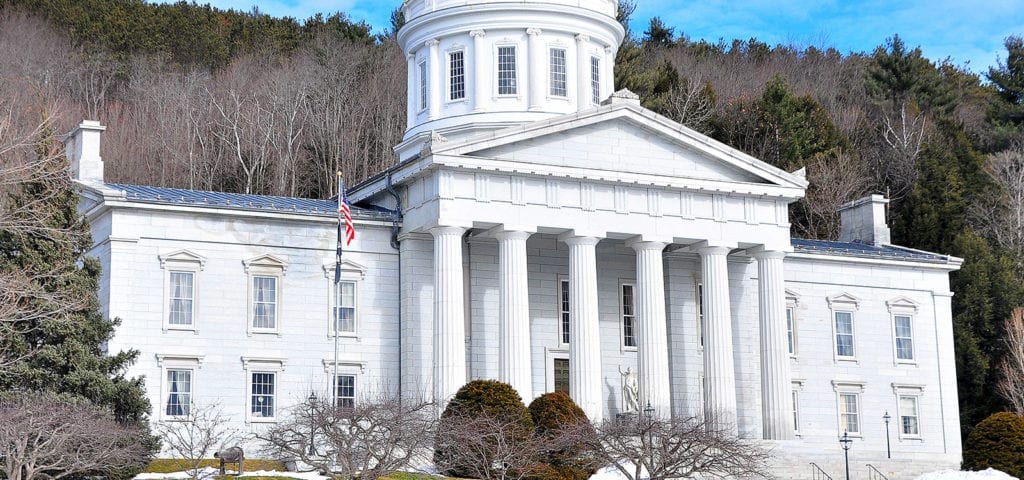On the eve of Attorney General Jeff Sessions’ directive to rescind the cannabis industry protections in the Cole Memo, House lawmakers in Vermont pushed forward a bill to legalize cannabis for adults, passing the measure 81-63. If approved by the Senate – the vote is expected on Tuesday – and signed by Gov. Phil Scott, Vermont would become the first state to legalize cannabis via the legislative process.
On Thursday, members sparred over the final details of H.511 – punctuated by Scott’s State of the State address – proposing and debating the merit of several amendments; passing just one from Republican Rep. Anne Donohue requiring written permission to cultivate cannabis on someone else’s property – such as a landlord – but rejecting the majority.
The bill eliminates all possession penalties up to an ounce for adults 21-and-older, allowing them to grow two mature and four immature plants per household. The measure does not create a tax-and-regulate system and an amendment by Republican Rep. Don Turner to establish such a program was defeated. The opposition appealed until the final roll – after proposing amendments to delay or otherwise limit some aspects of the scope – but the approved version is nearly identical to what landed on Scott’s desk last May. Notably, the language does not address “gifting” or “donating” cannabis from adult-to-adult, which could allow cannabis-friendly events in the state.
Among the amendments shot down: Republican Rep. James Harrison’s proposal to delay the rollout to July 2019; and two by Democratic Rep. Cynthia Browning – one to limit possession in homes to two pounds, and another that would have prevented the implementation of the program until the development of a roadside cannabis drug test to measure impairment. Browning argued that by not capping the amount of cannabis allowed in a person’s home, lawmakers were creating a “loophole” for drug dealing.
An amendment included in the previous measure to create a tax-and-regulate commission was removed because Scott has already appointed his own task force, whose report is expected at the end of 2018. The legislation includes enhanced enforcement of “open container” laws and consuming cannabis in a vehicle, and creates a fine-only misdemeanor crime for using cannabis in a vehicle with a minor. Language to reduce home-made extracts is also included in the bill, making it a crime for non-dispensaries to manufacture concentrates by “chemical extraction or chemical synthesis using butane or hexane.”
NORML Political Director Justin Strekal called the progress “groundbreaking.”
“Should the Green Mountain State’s leadership move forward as promised, it will mark a huge turning point in the national movement to end the criminalization of marijuana,” Strekal said in a statement. “The political courage of Vermont’s lawmakers to break with nearly a century of legislative stagnation should be interpreted as a siren call in the halls of the state legislatures nationwide as well as the U.S. Capitol.”
Matthew Schweich, interim executive director for the Marijuana Policy Project declared the vote a rebuke of Attorney General Jeff Sessions’ announcement earlier in the day that he was removing the federal protections of the 2013 Cole Memo – potentially putting a target on the back of state-approved cannabis programs of all varieties.
“It is becoming clear that states are tired of helping the federal government enforce outdated and harmful marijuana policies and are ready to make this legal for adults,” said Matthew Schweich, interim executive director for the Marijuana Policy Project. “The Vermont Legislature’s action underscores that states will continue leading the way toward more humane, sensible marijuana policies even if this administration reverts to the cruel and counterproductive federal policies of the past.”
A Public Policy Polling survey in March found 57 percent of Vermonters supported this could-be regime with 39 percent opposed. When confronted with tax-and-regulate, support shrank to 54 percent with 40 percent opposed. The measure moves to the Senate – which has already confirmed the bill – and, if approved, to the governor’s desk. Scott has indicated he would sign a revised reform package after vetoing legalization legislation passed by both chambers last May. At that time, it was the House that refused to hold a special veto session to reconsider the measure.
Get daily cannabis business news updates. Subscribe
End
